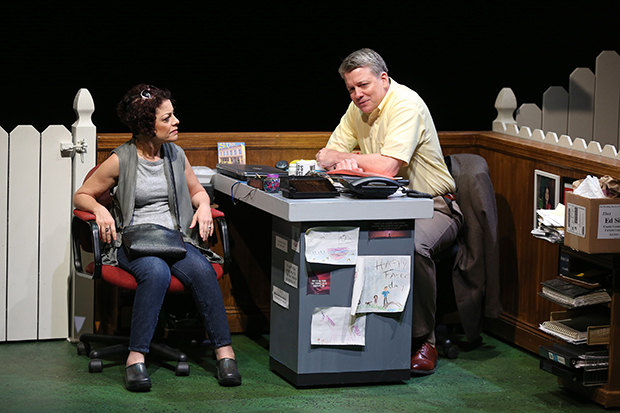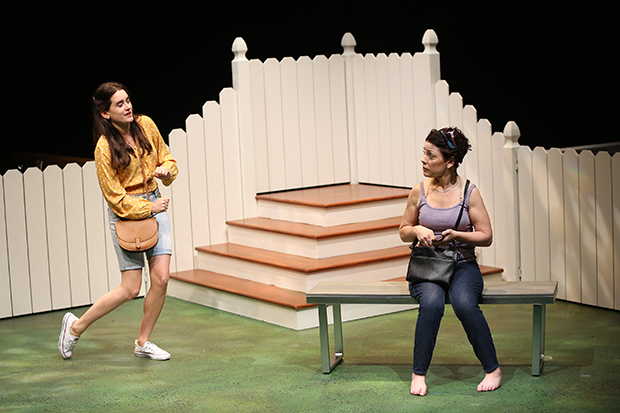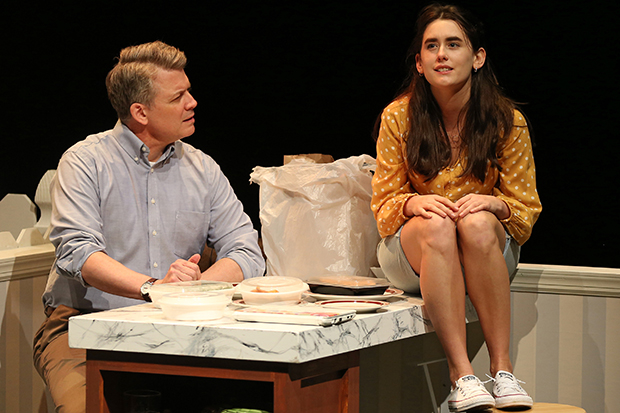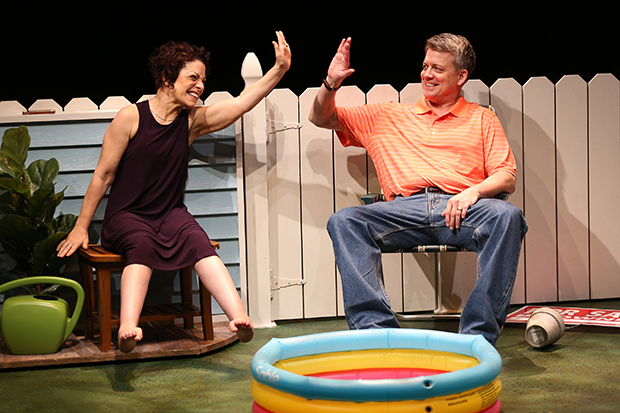Public Servant Sheds Light on the Private Life of an Elected Official
”The Cake” author Bekah Brunstetter presents a world premiere with Theater Breaking Through Barriers.

(© Carol Rosegg)
When you break through a barrier, the demolition still leaves an obstacle course of rubble. All three of the characters in Bekah Brunstetter's Public Servant (now making its world premiere with Theater Breaking Through Barriers at Theatre Row) are facing obstacles that are daunting, but ultimately surmountable through human kindness and a willingness to compromise. That makes Public Servant a heartwarming vision of how life could be, if not a particularly enthralling drama.
Through her work on the heartstring-tugging TV series This Is Us and her recent off-Broadway dramedy The Cake (about a Christian baker faced with the prospect of creating a cake for a gay wedding), Brunstetter has emerged as a poet of peace in a time of raging culture war. This is commendable when it has become a national pastime to "drag" and "burn" our ideological adversaries on Twitter, and it gives her plays an unlikely air of transgression in the progressive bastion of off-Broadway. Brunstetter portrays good people from across the political spectrum grappling with their own biases, and in doing so she confronts the audience with the possibility that the biggest obstacle to progress is sometimes our own stubbornness.

(© Carol Rosegg)
Of course, there are other obstacles too, and Public Servant opens with a powerful visual depiction of one: Miriam, a woman with cerebral palsy portrayed by Christine Bruno (an actor with CP), stares down the stairs leading up to the office of Forsyth County commissioner Ed Sink (Chris Henry Coffey). She needs to speak with him about the freeway that is set to be built just behind her late mother's home. Miriam wants more than anything to have a child, and she's already blown her modest savings on unsuccessful fertility treatments. A teacher living in New York, she has returned to North Carolina to raise more money by selling the house, but the planned highway has rendered the property almost worthless. So she braces herself for the difficult climb.
Drained by constituent demands, Sink has other priorities, including the restoration of a beloved public pool. Privately, he is dealing with the breakdown of his marriage and the early return of his daughter, Hannah (Anna Lentz), fresh off her first year at college and newly woke. She sees her dad as a hero, but his dismissive treatment of Miriam is liable to change her mind.

(© Carol Rosegg)
Although their performances feel broad, the three actors fully commit to each beat. Lentz is skittish and eager to be liked as the 19-year-old Hannah. Bruno is an emotional Mallomar as Miriam, exhibiting the hard exterior of a big-city schoolteacher. And yet she dissolves into mushy tears at the drop of a hat, a choice that feels excessive until we remember that she's being pumped full of hormones. Exuding aw-shucks folksiness as Ed, Coffey feels like the star of an exceptionally long life-insurance commercial. Such affectation is not unexpected from a small-time politician, however, when life so often imitates the prevailing art.
Director Geordie Broadwater crafts some tender moments between the actors, but it's not enough to compensate for a sluggish production. Even with sound designer Sam Crawford's North Carolina-themed underscoring and the performances extended a beat into the transition (usually in the form of a meaningful stare into the distance), we cannot help but notice the black-clad stagehands scrambling to set up the next scene. This is despite a clever set design from Edward T. Morris, in which each location folds out from a white picket fence, messy reality emerging from the picture-perfect veneer of suburbia. Still, the transitions are too long and too frequent, brought forth by a script that demands far more locations than it actually needs to tell this story.

(© Carol Rosegg)
As with The Cake, Brunstetter wraps everything up in an almost ludicrously happy conclusion. No painful sacrifices are made and the stakes remain catatonically low. It doesn't feel much like America in 2019, but Brunstetter kindly invites us to bask in the sunny optimism of her alternate reality.







